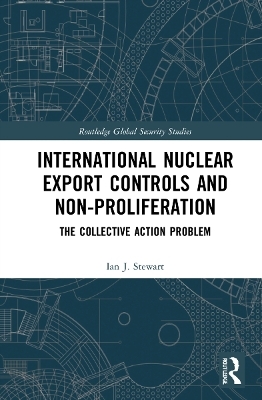
International Nuclear Export Controls and Non-Proliferation
The Collective Action Problem
Seiten
2023
Routledge (Verlag)
978-1-032-04688-4 (ISBN)
Routledge (Verlag)
978-1-032-04688-4 (ISBN)
This book examines the evolution of international nuclear non-proliferation trade controls over time.
The book argues that the international nuclear export controls have developed in a sub-optimal way as a result of a non-proliferation collective action problem. This has resulted in competition among suppliers, owing to the absence of an overarching effective system of control. While efforts have been undertaken to address this collective action problem and strengthen controls over time, these measures have been inherently limited, it is argued here, because of the same structural factors and vested interests that led to the creation of the problem in the first place. This study examines international controls from the beginning of the nuclear age and early efforts to control the atom, up to more recent times and the challenge posed by Iranian and North Korean nuclear ambitions. Drawing on a rich body of original archival research and interviews, the book demonstrates that the collective action problem has restrained cooperation in preventing nuclear proliferation and that gaps persist in the international nuclear trade control regime.
This book will be of much interest to students of nuclear proliferation and arms control, security studies, and International Relations.
The book argues that the international nuclear export controls have developed in a sub-optimal way as a result of a non-proliferation collective action problem. This has resulted in competition among suppliers, owing to the absence of an overarching effective system of control. While efforts have been undertaken to address this collective action problem and strengthen controls over time, these measures have been inherently limited, it is argued here, because of the same structural factors and vested interests that led to the creation of the problem in the first place. This study examines international controls from the beginning of the nuclear age and early efforts to control the atom, up to more recent times and the challenge posed by Iranian and North Korean nuclear ambitions. Drawing on a rich body of original archival research and interviews, the book demonstrates that the collective action problem has restrained cooperation in preventing nuclear proliferation and that gaps persist in the international nuclear trade control regime.
This book will be of much interest to students of nuclear proliferation and arms control, security studies, and International Relations.
Ian J. Stewart is Executive Director of the James Martin Center for Nonproliferation Studies in Washingtong DC, USA.
1. Introduction: international nuclear export controls and non-proliferation, and the collective action problem 2. The missed opportunity? Effective control of atomic energy 3. Atoms, sometimes for peace: the emergence of the non-proliferation collective action problem 4. Strategies that failed? US non-proliferation strategy from 1964 to 1980 5. International nuclear trade controls after the Cold War 6. Universalising non-proliferation trade controls 7. Conclusions
| Erscheinungsdatum | 05.10.2021 |
|---|---|
| Reihe/Serie | Routledge Global Security Studies |
| Zusatzinfo | 1 Tables, black and white |
| Verlagsort | London |
| Sprache | englisch |
| Maße | 156 x 234 mm |
| Gewicht | 440 g |
| Themenwelt | Sozialwissenschaften ► Politik / Verwaltung ► Europäische / Internationale Politik |
| Sozialwissenschaften ► Politik / Verwaltung ► Politische Systeme | |
| Sozialwissenschaften ► Politik / Verwaltung ► Staat / Verwaltung | |
| ISBN-10 | 1-032-04688-0 / 1032046880 |
| ISBN-13 | 978-1-032-04688-4 / 9781032046884 |
| Zustand | Neuware |
| Informationen gemäß Produktsicherheitsverordnung (GPSR) | |
| Haben Sie eine Frage zum Produkt? |
Mehr entdecken
aus dem Bereich
aus dem Bereich
Studienbuch
Buch | Hardcover (2023)
De Gruyter Oldenbourg (Verlag)
44,95 €
Amerikas Strategie der Vorherrschaft und der Kampf um Eurasien
Buch | Softcover (2024)
NOMEN Verlag
20,00 €


